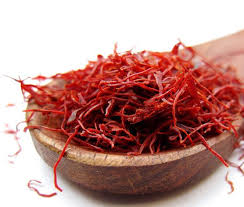Saffron is a precious spice derived from the Iridaceae family under the name of crocus stativus.
There are unique compounds in saffron which turn it into a valuable element in the nutritional diet. Saffron contains more than 150 useful compounds including carotenoids, safranal, crocin, antioxidants, and other beneficial biochemistry as well as minerals and vitamins A and C, riboflavin, vitamin B3, vitamins B1, B6, B12, potassium, iron, magnesium, phosphorus, sodium and zinc. A detailed description of the properties of saffron and its nutritional value will be provided below.

Benefits of using saffron and its effects on the human body can be described in short phrases like: enhancing the function of the respiratory system, improving the function of the gastrointestinal system and a being tranquilizer, treating insomnia, preventing from cancer, improving the cardiovascular function and increasing blood circulation, controlling diabetes, strengthening the bones as well as boosting the function of the immune system of body.
We further describe the effects of using saffron in the daily diet on the physiology of the body.
Eating saffron increases the blood circulation throughout the body which, in turn, enhances metabolism. Iron in saffron prevents from anemia and, as a result, improves the function of tissues and organs.
One way to boost performance and health of the cardiovascular system is to increase potassium in the body which can be achieved by consuming saffron. Potassium in saffron widens blood vessels (is a vasodilator) by loosening and relaxing the muscle cells in the vessel wall, thereby effectively decreasing pressure on blood vessels and arteries and preventing from heart attack and strokes.
There is an element in the human body called magnesium consuming of which can optimize the blood sugar level and prevent from type 2 diabetes. The saffron spice is rich with magnesium and contains many compounds which affect the endocrine glands and release useful hormones that protect the body’s health and treat depression.
Some minerals and organic compounds in saffron cause optimized intake of nutrients, especially calcium which prevent from osteoporosis and increase bone density. Vitamin B in saffron boosts the neural system of the body. Also, safranal, which is an important compound in saffron spice, is a strong tranquilizer and pain killer helping to reduce stress and anxiety. This valuable spice contain more than 100 various compounds in the form of antioxidants which are able to hinder growth of cancer cells throughout the body. Saffron is used to cure digestive disorders and it is one of the oldest and best known treatments for tympanites. It also heals constipation and peptic ulcer disease. Consuming saffron in the conventional food diet has no side effects or allergic effects at all.
Products